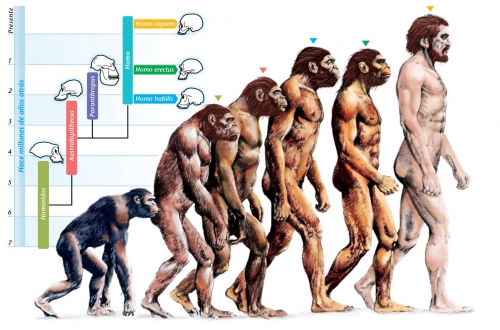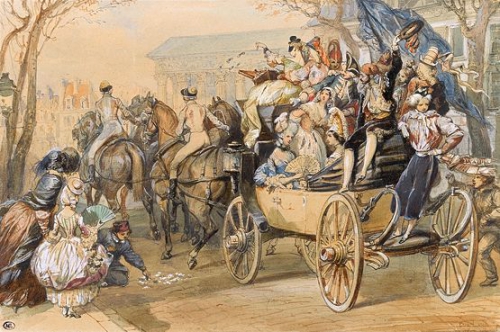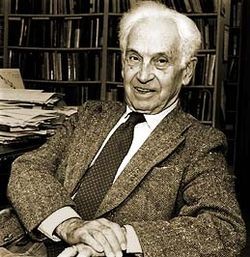La psychologie évolutionniste est le fruit de la rencontre entre la psychologie et la théorie de l’évolution. Elle vise à expliquer les comportements humains sur la base d’hypothèses évolutionnistes.
Comment ça marche ?
Dans son acceptation universelle, cette nouvelle manière de concevoir le fonctionnement de l’esprit postule qu’à l’exemple des autres organes, le cerveau également a été façonné par la sélection naturelle. L’hypothèse est la suivante : lorsque certains problèmes universels se sont posés à nos ancêtres des cavernes, ceux qui possédaient les capacités cognitives les plus adaptées à leur résolution ont survécu et se sont multipliés alors que les autres disparaissaient. De cette manière, le cerveau de l’espèce humaine s’est adapté de manière à fournir les meilleures potentialités de résolution des situations problématiques rencontrées par nos prédécesseurs chasseurs-cueilleurs.
La quasi-totalité des humains de la préhistoire ont été confrontés à des problèmes globalement assez similaires. Ils ont notamment dû faire face à de longues périodes de fluctuations climatiques et ont été obligés de s’adapter à certaines contraintes issues de leur environnement proche. Comme la vie isolée du groupe n’était pas possible, ils ont également été exposés à des dynamiques sociales complexes plus ou moins pareilles. Celles-ci se sont exprimées au sein du groupe tout comme dans les relations entretenues avec d’autres clans humains. Face à des contraintes existentielles fortes et universelles, le cerveau humain a muté petit à petit pour permettre aux hommes d’acquérir le plus simplement possible toute une série de compétences nécessaires à leur survie.
L’évolutionniste David Geary classifie ces capacités dans un groupe commun appelé capacités primaires ou naïves. Elles sont naïves car, selon lui, après plusieurs dizaines/centaines de milliers d’années d’évolution, le génie humain est désormais naturellement programmé pour que ces compétences se développent par elles-mêmes, sans effort particuliers, inconsciemment et très rapidement. Le degré de complexité de ces compétences ne change absolument rien à l’affaire.
Mais quelles sont donc ces compétences primaires ?
Dès que l’homme des cavernes a été amené à bâtir des abris, à créer des outils pour la chasse ou à user du feu pour cuisiner et ainsi augmenter ses chances de survie, il lui a fallu définir ses besoins pour y arriver, explorer et analyser son environnement proche et en extraire les ressources nécessaires. En conséquence, et puisque ces activités se sont perpétuées sur de longues périodes, le cerveau de l’homme s’est adapté de manière à faciliter la mise en branle de ces compétences. Ainsi, des modifications sont intervenues et, depuis, l’être humain a acquis des prédispositions innées à résoudre des problèmes. Il en va également de même dans le domaine des interactions sociales
Comme l’encéphale de nos élèves est calibré de manière à ce que ces compétences primaires se développent naturellement, il en découle que les dispositifs pédagogiques de résolution de problème, de découverte, d’enquête ou autre projet sont inutiles en terme de développement de compétences. Tout comme d’ailleurs les systèmes d’enseignement visant à développer des compétences transversales du type communicatives ou collaboratives. Si tout cela se fait naturellement, inutile de réinventer l’eau chaude systématiquement en classe. Concentrons plutôt nos efforts sur des choses qui en valent la peine.
Le seul résidu d’utilité qui peut éventuellement rester à ces méthodes réside dans l’acquisition de connaissances qu’elles peuvent susciter. Or, à ce sujet, les études empiriques menées à ce jour sont claires : ces méthodes d’apprentissage ne génèrent qu’une efficacité très limitée. La thèse évolutionniste abat ainsi définitivement les derniers vestiges de crédibilités qui pouvaient rester au constructivisme éducatif.
Autres apports évolutionnistes
L’apport de Geary et des évolutionnistes pour le domaine éducatif ne s’arrête pas là. Leur théorie prétend également répondre à la lancinante question du « pourquoi apprendre » et donc, par là même, du contenu de ces apprentissages. Selon eux, en exerçant et développant leurs compétences primaires, les hommes ont développés d’autres connaissances qui, elles, n’étaient pas nécessaires à leur survie directe. Ainsi, au fur et à mesure que les sociétés ont crû, qu’elles ont évolué, elles ont acquis un corpus de connaissances culturelles et scientifiques dont la nature diverge profondément des habilités primaires : les connaissances secondaires. Soit qu’elles soient trop récentes soit qu’elles n’aient pas trait à la survie de l’espèce, ces nouveaux savoirs n’ont pas suscité de développement particulier du cerveau et nécessitent donc un effort particulier et important pour être assimilés.
L’accumulation de ces nouvelles connaissances a permis aux hommes d’aller de plus en plus loin, de s’éloigner de plus en plus du concret de tous les jours et d’atteindre des niveaux d’abstraction de plus en plus conséquents. Les savoirs ainsi générés s’éloignent ainsi de plus en plus des aptitudes primaires humaines. Voici deux exemples pour illustrer le cas : en mathématiques, l’aspect très concret de la géométrie la place à proximité des aptitudes primaires alors que l’algèbre, abstrait, en constitue un pôle bien plus éloigné. Dans le domaine de la langue maternelle, la lecture et l’écriture, inventions culturelles tardives, sont nettement plus éloignés des capacités primaires que ne peut l’être l’expression présente très tôt dans l’histoire de l’humanité.
A ce sujet, il faut aussi noter que puisque les élèves sont pré-conditionnés au développement de leurs capacités primaires, ils sont aussi naturellement motivés à les utiliser. Ce qui explique pourquoi un déficit de motivation peut survenir dès lors qu’on les en éloigne. La nature humaine telle qu’elle s’est développée au travers de l’évolution interfère donc régulièrement dans l’acquisition des savoirs académiques.
Enfin, selon Geary, les écoles sont apparues dans nos sociétés dès lors que l’écart existant entre les compétences primaires et les aptitudes secondaires non vitales mais que la société estime nécessaires à une bonne intégration est devenu trop conséquent pour que les habilités primaires permettent à chacun de les acquérir par soi-même. L’école doit donc servir d’accélérateur pour leur acquisition. Ce qui signifie notamment que plus l’objectif à atteindre est éloigné des capacités primaires de l’élève, plus il est nécessaire que le guidage exercé par l’enseignant soit important car les capacités propres de l’élèves ne lui permettent pas d’y arriver seul.
De tout ceci il me semble pouvoir déduire que :
- Le constructivisme n’a pas sa place dans l’éducation sauf éventuellement pour atteindre les objectifs les moins élevés et ambitieux, ceux dont la nature les place à proximité des capacités
- Le travail sur la plupart des compétences générales/transversales n’a que très peu d’intérêt. Les compétences ne prennent du sens qu’en tant que combinaisons complexes de différentes connaissances académiques.
- Une école utile et efficace est une école qui laisse aux individus la responsabilité des apprentissages qu’ils peuvent effectuer facilement tout seul (apprentissage basé sur l’utilisation des capacités primaires) et se concentre plutôt sur ce qui est plus difficile à atteindre tout seul.
- Pour y arriver un guidage direct important des enseignants est nécessaire. Celui-ci doit être en adéquation avec l’architecture cognitive des élèves
- Le déficit motivationnel dû à la nature des savoirs à acquérir doit être comblé par des systèmes pédagogiques efficaces permettant l’émergence d’un nouveau type de motivation issue du sentiment d’efficacité personnelle.
Autant dire que si on se fie à l’approche évolutionniste, notre école fait à peu près tout faux aujourd’hui.
Stevan Miljevic, le 5 février 2016 pour contrereforme.wordpress.com et lesobservateurs.ch
PS: certaines conclusions émises ici bas ne sont pas celles de l'auteur étudié mais celles que j'ai personnellement déduites de ces lectures
Bibliographie et sitographie:
David Geary "The why of learning" in Educational Psychologiste, July 2009 pp.198-201 disponible ici https://www.researchgate.net/publication/233080942
David Geary "Evolution and Education" in Psicothema, February 2010 disponible ici https://www.researchgate.net/publication/41138739
David Geary "Primal Brain in the modern classroom" disponible ici https://www.researchgate.net/publication/253952304_Primal_Brain_in_the_Modern_Classroom
David Geary "Principles of Evolutionary Educational Psychology" in Learning and individual differences, July 2013 disponible ici https://www.researchgate.net/publication/222830140





 del.icio.us
del.icio.us
 Digg
Digg


